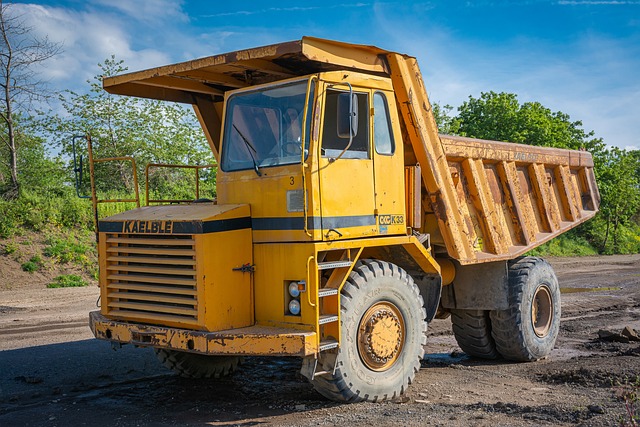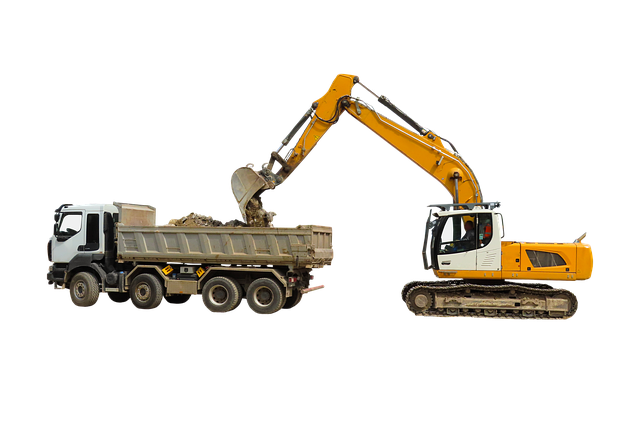To ensure the longevity and reliability of dump trucks amidst heavy usage and challenging conditions, a comprehensive maintenance strategy is indispensable. This involves rigorous inspections and prompt repairs to protect against environmental and operational wear and tear. Key focus areas include safeguarding the drivetrain, hydraulic systems, and electrical components, which are prone to stress and degradation over time. Advanced predictive maintenance technologies can anticipate potential issues, allowing for timely interventions that prolong equipment life and minimize downtime. Regular cleaning, adherence to manufacturer-recommended intervals, and the use of premium parts further enhance these vehicles' durability.
Operators must practice good driving habits to prevent excessive wear, such as limiting idling, adhering to weight capacity limits, and avoiding overloading. Proper loading techniques are essential to maintain structural integrity and operational stability. Detailed maintenance records not only aid in upkeep but are often legally mandated to ensure consistent performance and reliability from the dump truck.
Engine health is paramount, with routine oil and filter changes, along with vigilant coolant system monitoring, to prevent overheating. The drivetrain requires regular servicing to maintain smooth operation, while tire maintenance—checking for proper inflation, tread depth, and damage—is crucial for traction and handling. A tailored maintenance checklist designed specifically for dump trucks is necessary to guarantee longevity and preserve the vehicle's value for resale.
For safe operation in demanding terrains and adverse weather, high-quality rugged dump trucks with sturdy frames and reinforced tires are essential. Skilled drivers, equipped with safety gear, are crucial for navigating treacherous environments. Proactive measures such as strategic route planning and weather forecasting contribute to safety and efficiency, ensuring that the dump truck continues to serve its critical role effectively. Regular maintenance is key to preventing major issues and maintaining operational readiness, making it a pivotal aspect of heavy machinery operations.
Protecting your dump truck’s integrity is paramount for sustained performance and reliability on the job. This article delves into the critical practices that safeguard both your equipment and drivers, ensuring operational efficiency and compliance with safety standards. We’ll explore strategies to maintain your dump truck’s longevity, from routine maintenance checklists to navigating the demands of challenging terrains and adverse conditions. Join us as we equip you with the knowledge to keep your operations running smoothly and your team safe.
- Understanding the Importance of Equipment Safeguarding for Dump Truck Operations
- Best Practices for Maintaining Your Dump Truck's Longevity and Performance
- Essential Maintenance Checklists to Keep Your Dump Truck Running Smoothly
- Navigating Challenges: Ensuring Driver Safety and Equipment Protection in Rough Terrain and Adverse Conditions
Understanding the Importance of Equipment Safeguarding for Dump Truck Operations

In the context of heavy machinery operations, particularly within the domain of dump truck usage, safeguarding equipment is paramount. The robust nature of dump trucks, designed for hauling and transporting materials, means they are often subject to harsh conditions and demanding tasks. To maintain optimal performance and longevity, it is crucial to implement a comprehensive maintenance schedule. This includes regular inspections, timely repairs, and the use of protective measures against environmental factors such as extreme weather or terrain challenges that can compromise their integrity. By doing so, operators ensure the reliability of their dump trucks, which in turn enhances efficiency and productivity on construction sites, mines, and quarries.
The strategic safeguarding of dump truck equipment also encompasses the protection of its critical components, namely the drivetrain and hydraulic systems. These elements are particularly vulnerable to wear and tear, and their failure can lead to significant operational downtime and costly repairs. Employing advanced technologies such as predictive maintenance software can anticipate potential issues before they arise, thereby minimizing disruptions and extending the service life of the machinery. This proactive approach not only safeguards the equipment but also guarantees the continuity of operations, which is essential for projects with tight deadlines and stringent resource allocation requirements.
Best Practices for Maintaining Your Dump Truck's Longevity and Performance

Regular maintenance is key to ensuring your dump truck operates at peak performance and enjoys a long service life. Implementing a routine maintenance schedule that includes frequent inspections of the drivetrain, hydraulic systems, and tire condition can prevent many issues before they arise. Pay particular attention to the engine’s oil levels and quality, as well as the cooling system’s effectiveness; these are critical components in maintaining optimal truck performance. Additionally, ensuring that all electrical connections are secure and clean can mitigate potential malfunctions caused by poor battery charge or faulty wiring. By adhering to manufacturer guidelines for maintenance intervals and using high-quality replacement parts, you can extend the lifespan of your dump truck significantly.
Operators should also practice good driving habits to minimize wear and tear on the vehicle. This includes avoiding excessive idling, operating within the truck’s weight capacity, and ensuring that the dump truck is not overloaded, as this can cause undue stress on the chassis and components. Proper loading techniques are essential to prevent cargo from shifting during transport, which could lead to structural damage or instability while in operation. Regularly cleaning the truck, especially the undercarriage, can prevent corrosion and maintain the vehicle’s structural integrity over time. Lastly, keeping accurate records of all maintenance performed is not only a best practice but also a legal requirement in many jurisdictions, ensuring that your dump truck remains reliable and ready for the demands of its tasks.
Essential Maintenance Checklists to Keep Your Dump Truck Running Smoothly

Regular maintenance is the cornerstone of ensuring your dump truck operates at peak efficiency. A comprehensive checklist tailored for dump trucks should include frequent inspections of critical components such as the braking system, suspension, and tires. The brakes, particularly in a dump truck that often carries heavy loads, are subject to intense wear and tear. Ensuring they are functioning correctly is not just about safety but also longevity. Similarly, the suspension system must be inspected regularly for any signs of damage or excessive wear, as this can significantly impact the truck’s performance and fuel efficiency. Tires should be checked for proper inflation, tread depth, and any damage that could compromise traction and handling.
Beyond these, engine maintenance is paramount for a dump truck. The engine oil and filters must be changed according to the manufacturer’s recommendations or more frequently if operating in harsh conditions. Monitoring the engine’s coolant system is also crucial to prevent overheating, which can lead to costly repairs. Additionally, the drivetrain, including the transmission and differentials, should be serviced regularly to maintain smooth shifting and protect against damage from dirt and debris. A well-maintained dump truck not only reduces downtime but also enhances its resale value by preserving its mechanical integrity over time. Adhering to a detailed maintenance checklist specifically designed for dump trucks is essential for their longevity and reliability, ultimately safeguarding your investment in this heavy machinery.
Navigating Challenges: Ensuring Driver Safety and Equipment Protection in Rough Terrain and Adverse Conditions

When operating a dump truck in rough terrain and adverse conditions, the primary concern is ensuring both driver safety and the preservation of the equipment. The resilience of a dump truck is often tested against steep slopes, loose gravel, or treacherous weather, making it imperative to invest in high-quality vehicles designed for such environments. These trucks are equipped with robust frames and reinforced tires to handle the stress of challenging terrains, reducing the likelihood of mechanical failure or accidental rollover. Additionally, drivers must be well-trained, experienced, and equipped with the necessary safety gear; this includes seat belts, protective helmets, and possibly harnesses for extreme angles or inclines. Regular maintenance checks are crucial to identify potential issues before they escalate into major problems, thereby minimizing downtime and ensuring the dump truck remains operational under harsh conditions. Proactive measures such as route planning, considering terrain difficulty, and weather forecasts can further mitigate risks, allowing the dump truck to fulfill its critical role in transporting materials efficiently and safely.
In conclusion, proactive measures in safeguarding your dump truck’s equipment and ensuring driver safety are critical for sustained performance and longevity. By adhering to the outlined best practices for maintenance and implementing robust safety protocols, operators can navigate rough terrain and adverse conditions with confidence. Regularly following the maintenance checklists provided will keep your dump truck running smoothly, reducing the risk of costly downtime and ensuring that your investment remains operational at peak performance. The insights discussed in this article underscore the importance of a comprehensive approach to equipment care and driver protection, ultimately safeguarding your operation’s success in the long term. Remember to stay vigilant and keep these strategies top of mind for consistent, reliable dump truck operations.
